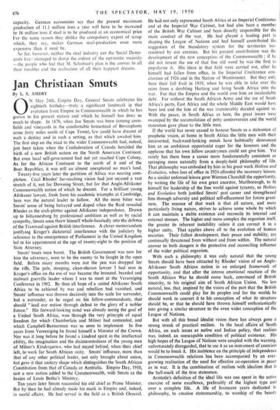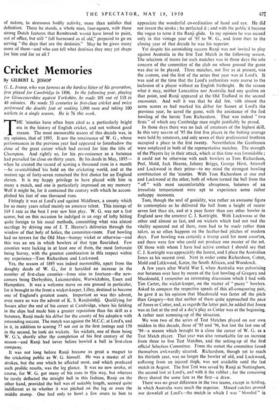Jan Christiaan Smuts By L S. AMERY 0 N May
24th, Empire Day, General Smuts celebrates his eightieth birthday—truly a significant landmark in that evolution from Empire to Commonwealth in which he has grown to his present stature and which he himself has don:: so much to shape. In 1870, when Jan Smuts was born (among corn- fields and vineyards in the comfortable homestead of Bovenplants some forty miles north of Cape Town), few could have dreamt of such a destiny and in such a setting, as that which awaited him. The first step on the road to the wider Commonwealth had, indeed, just been taken when the Confederation of Canada heralded the birth of a new British nation on the North American Continent. But even local self-government had not yet reached Cape Colony. As for the African Continent to the north of it and of the Boer Republics, it was still an almost unexplored no man's land.
Twenty-five years later the partition of Africa was nearing com- pletion. Cecil Rhodes' far-reaching vision had just secured a vast stretch of it, not for Downing Street, but for that Anglo-Afrikaner CommonWealth nation of which he dreamt. For a brilliant young Afrikaner lawyer, fresh from his academic triumphs at Cambridge, here was the natural leader to follow. All the more bitter was Sniuts' sense of being betrayed and duped when the Raid revealed Rhodes as the arch-plotter against Afrikaner independence. Drawn up to Johannesburg by professional ambition as well as by racial sympathy, Smuts soon threw himself whole-heartedly into the defence of the Transvaal against British interference. A clever memorandum justifying Kruger's dictatorial interference with the judiciary by reference to the omnipotence of Parliament in the United Kingdom led to his appointment at the age of twenty-eight to the position of State Attorney.
Smuts' boats were burnt. The British Government was now for him the adversary, soon to be the enemy to be fought in the open field. Before many months were out the pen was dmpped for the rifle. The pale, stooping, clean-shaven lawyer I had seen in Kruger's office on the eve of war became the bronzed, bearded and stalwart guerrilla leader whom I was to meet at the Vereeniging Conference in 1902. By then all hope of a united Afrikaner South Africa to be achieved by war and rebellion had vanished, and Smuts' influence was thrown decisively into the scale for surrender, but a surrender, as he urged on his fellow-commandants, that should " lead our nation through defeat to the glory of a nobler future." His forward-looking mind was already seeing the goal of a United South Africa, won through the very principle of equal freedom for which Chamberlain and Milner had contended, and which Campbell-Bannerman was so soon to implement. In five years from Vereeniging he found himself a Minister of the Crown. Nor was it long before he found a kindred spirit in the intellectual ability, the imagination and the disinterestedness of the young men of Milner's Kindergarten, who had stayed behind, when their chief left, to work for South African unity. Smuts' influence, more than that of any other political leader, not only brought about union, but gave it that unitary shape which distinguishes the South African Constitution from that of Canada or Australia. Empire Day, 1910, Sark a new nation added to the Comrhonwealth, with Smuts as the brains of Louis Botha's Ministry. '
Ten years later Smuts succeeded his old chief as Prime Minister. But by then he had already made his mark in Empire and, indeed, in world affairs. He had served in the field as a British General. He had not only represented South Africa at an Imperial Conference and at the Imperial War Cabinet, but had also been a member of the British War Cabinet and been directly responsible for the main conduct of the war. He had played a leading part in shaping the League of Nations and had himself contributed the suggestion of the thandatory system for the territories 'sur- rendered by our enemies. But his greatest contribution was the development of the new conception of the Commonwealth ; if he did not invent the use of that fine old word he was the first to popularise it. His ideas in that field were carried out, after he himself had fallen from office, in the Imperial Conference con- clusions of 1926 and in the Statute of Westminster. But they only bore their full fruit in 1939, when he was able to take over the rcins from a doubting Hertzog and bring South Africa into the war. For that the Empire and the world owe him an incalculable debt. For without the South African Army and the use of South Africa's ports, East Africa and the whole Middle East would have been lost and the fate of the war irretrievably decided against us. With the peace, in South Africa as here, the great issues were swamped by the accumulation of petty controversies and the world statesman gave placelo the little men.
If the world has never ceased to honour Smuts as a statesman of prophetic vision, at home in South Africa the little men with their introverted, backward-looking minds have habitually denounced him as an ambitious opportunist eager for the honours and the applause that his own fellow countrymen could not give him. Yet rarely has there been a career more fundamentally consistent or springing more naturally from a deeply-held philosophy of life. That philosophy was embodied by him in his great work Holism and Evolution, when loss of office in 1924 afforded the necessary leisure. As a similar enforced leisure gave Winston Churchill the opportunity, by writing the life of his own great ancestor, Marlborough, to fit himself for leadership of the free world against tyranny, so Holism and Evolution both justified Smuts' past career and strengthened him through adversity and political self-effacement for future great- ness. The essence of that work is that all nature, and more particularly living nature, strives to achieve some whole by which it can maintain a stable existence and reconcile its internal and external stresses. The higher and more complex the organism itself, the greater its inherent instability unless it can correct it in a higher unity. That applies above all to the evolution of human societies. Their fullest development, their peace and stability, are continually threatened from without and from within. The natural answer to both dangers is the protective and reconciling influence of the wider political organism.
With such a philosophy it was only natural that the young Smuts should have been attracted by Rhodes' vision of an Anglo- Afrikaner South African nation in an enlarged framework of opportunity, and that after the intense emotional reaction of the South African War he should come back, convinced of British sincerity, to his original aim of South African Union. No less natural, too, that, inspired by the vision of the part that the British Commonwealth could play for its peoples and for the worlds he should work to convert it to his conception of what its structure should be, or that he should have thrown \himself enthusiastically into giving a similar structure to the even wider conception of the League of Nations.
But with all this broad idealist vision there has always gone a strong streak of practical realism. In the local affairs of Smith Africa, on such issues as native and Indian policy, that realisin was, indeed, an unescapable condition of political existence. His high hopes of the League of Nations were coupled with the warning, unfortunately disregarded, that to use it as an instrument of coercion would be to break it. His insistence on the principle of independence in Commonwealth relations has been accompanied by an ever- growing realisation of the need for effective co-operation in peace as in war. It is the combination of realism with idealism that is the hall-mark of the true statesman.
Aristotle's definition, of the ideal life was one spent in the active exercise of some excellence, preferably of the highest type and over a complete life. A life of fourscore years dedicated to philosophy, to creative statesmanship, to worship of the beauty of nature, to strenuous bodily activity, more than satisfies that definition'. There he stands, a whole man, four-square, with those strong Dutch features that Rembrandt would have loved to paint, out of office, but still "full harnessed as of old," prepared to go on serving " the days that are the destinies." May he be given many more of them—and who can tell what destinies they may yet shape for him and for us all ?











































 Previous page
Previous page